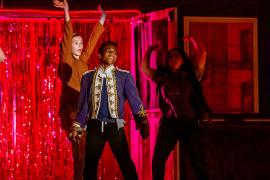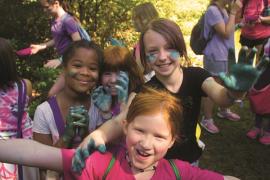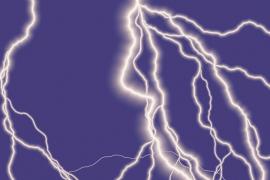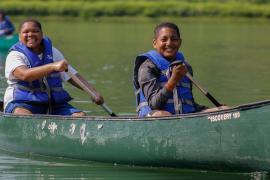In tears, a camper shares: “Camp is such a big part of me . . . I grew up here; I found out who I am here; I have spent my childhood here; I figured out my values here; and now I know I can do anything! I am more confident in school now. I really want to take what camp has given me and share it with the world!”
Those of us who have spent time in the camp environment understand, intuitively, the role of the camp experience in the education of a child. It’s when we start to quantify these benefits that we find ourselves struggling to find the words that lend credibility to what we know as exemplary education. This article is an introduction to an ongoing qualitative research study being conducted in Colorado regarding the link between the camp experience and the traditional school environment. This study is woven into a keynote address to be given by the author at the 2012 ACA National Conference.
Camp, as an activity for children, has graced the American landscape for 150 years. During this time, camps have introduced organizational themes upon which they structured themselves. There are probably as many of these themes as there are camps. However, it isn’t always about how a camp organizes itself, it’s also about what the ownership finds as valuable for the experience they are providing. The theoretical underpinnings that are foundational to the camp experience are as important as the organization. Certainly, there are no “rights” or “wrongs” here, just a multitude of differences and choices offered to the American public about how their children might engage in the offerings.
One concept that emerges from most every camp activity schedule is the idea of “fun.” Certainly, this is a concept worth exploring and one worth teaching children. This is where we, as human beings, begin to explore what might become our adult leisure time activities. Of course, this is a critical element as we reduce stress and enjoy the company of others. While “fun for fun’s sake” is a worthy goal, I would contend that fun with an articulated focus on education transcends the camp experience and extends to the pre-kindergarten through twelfth grade classrooms. A notable example is the mantra espoused by Roger A. Sanborn over sixty years ago when he and his wife, Laura, founded Sanborn Western Camps in central Colorado: “Fun and adventure with a purpose.” The purpose is education, and as the camp has evolved and grown, this mantra has remained fundamental to every aspect of the good work being done there.
It is at this intersection that the camp experience can inform the work being done in the public school system. I would further contend that the pre-kindergarten to twelfth grade schools in America are doing an incredible job with 100 percent of our students. As a former public school teacher and administrator, and as a current professor of education, I am continually impressed and awestruck by the tremendous work being done with students in the pre-kindergarten to twelfth grade arena. Of course, there is room for improvement — as is the case with most every human endeavor. The educators with whom I have the opportunity to work are continually refining their practices as well as their content. They are exploring better methodology, better delivery, and better ways of differentiating their instruction to meet the needs of each individual child. It is an overwhelming charge, and one that is best accomplished when community resources partner together to achieve the same goal. What better goal do we have as a democratic society than the education of our children? Thomas Jefferson (and others) wrote extensively on the importance of education as foundational if a society is to flourish. A public education is an opportunity for all, regardless of race, socio-economic status, gender, ability, or disability. It is the great equalizer. The framework established by the founding fathers provides access to educational opportunities for all citizens.
The delivery on this promise for American children is necessarily complex, as we work to educate children who come to us with different perspectives, different beliefs, and infinite dreams. It is exactly in this complexity that we can find our common denominator. We are all human beings, with similar basic needs that, once met, can springboard us into the lifelong pursuit of those dreams.
It is with this philosophical lens that I vehemently call for the purposeful, intentional partnership of quality outdoor, residential experiences with the public school mission. It is in this marriage that we can collectively and holistically meet the needs of students and prepare them for the lifelong pursuit of their dreams. Pre-kindergarten to twelfth grade schools are obligated to provide rigorous, relevant instruction around a curriculum based on state-adopted standards. This content rich instruction prepares students for their battery of assessments, which debatably measures their content mastery. Camps operating with an educational purpose have formally and informally incorporated the application of this content rich curriculum into their daily activities and adventures. A quality camp experience embraces the prekindergarten to twelfth grade experience, as camp allows students to exercise what they know, to investigate it, to interrogate it, and to define their own meaning around it. Garst, Browne, and Bialeschki (2011), note that effective camps “. . . include the people, programs, and interpersonal skills that allow young people to seek new information and test their existing knowledge in a safe environment” (p. 80). All the while, camps aid students in their development as they test their limits as leaders, intellectually, emotionally, socially, physically, and creatively.
It is my contention that camp is at the praxis of an overall educational journey that is rich with rigor and relevance. It is the combination of the traditional school environment with the fun-laden camp environment that provides relevance for learning and a context from which to build and grow. Richard Louv (2005) has challenged the American public to pay attention to what he has coined as “nature-deficit disorder.” He has provided compelling arguments for getting children outside. This notion has caught the attention of legislators, teachers, and parents, who recall their childhood with fondness, as they captured grasshoppers, created ant farms, lay on a hill and conjectured about the shapes of clouds, made mud pies, or marveled at the beauty of a field of Indian Paint Brush. These childhoods are in sharp contrast to the electronic childhood many children currently experience. This electronic childhood is certain to have pros and cons; however, as with most things, it’s in the striking of a balance that the pros are accentuated and the cons are minimized. While the Internet is an incredible tool, does it have meaning or relevance for children who have not felt the thrill of exploration or the adventure of imaginary voyage? It seems that those worthy experiences in nature can provide meaning, intellect, and critical consumption of the avalanche of information available to every child. “The experiential nature of camp activities, combined with the elements of choices, personal interest, skill development, and risk taking, allows structured camp activities to promote positive youth development” (Garst, Browne, & Bialeschki, 2011).
We are at a critical juncture — as learning becomes less of a nine-month duty and more of a life skill — to be gathered in most every context. It is here that credibility of the camp experience can engage and activate a love of learning. A child having fun while actively engaged in problem solving, resolving conf lict, developing leadership skills, and struggling toward a common goal with peers is the essence of schooling, isn’t it? It is this purpose that defines the meaning of camp! These are the twentyfirst century skills that camps easily provide. Schools find it difficult to teach these non-measureable skills. The data driven testing environment of the traditional school system has forced teachers to pay less attention to these very important soft skills in lieu of content that will be tested and might ultimately decide the fate of the teacher, the principal, and perhaps the school itself.
John Goodlad (1997) has dedicated a lifetime to the preparation of teachers and the analysis of what education in a democracy entails. His contention is that education happens best in a context of “simultaneous renewal,” a space where all participants benefit from the enterprise. It is this concept that dismisses the idea of educational “reform,” with rigid outcomes and competitive granting strategies. It is a notion that change is ongoing and that “renewal” allows for the continuation of a great democratic experiment — to educate every child! The growth continues and outcomes are morphed by the participants in light of their changing world views. It is this fluid look at educational processes that allows for critical thinking, collaboration, cooperation, and communication to f lourish and grow. These are the twentyfirst century skills that employers are demanding and that educational institutions find difficult to incorporate into their curricula. Nonetheless they are equally as important.
In the summer of 2011, I had an opportunity to interview campers about what they were gaining in their camp experiences in an effort to better understand these skills. It was great fun to work with these incredible young people whose candor, humor, and insight both engaged and humbled me throughout the interviews. These interviews will become the focus of the research study to be shared in Atlanta (see sidebar below for more information). The campers were asked to answer a series of open ended questions “regarding the relationship between [their] camp experience and [their] performance in the traditional school setting.” Campers represented most regions of the country. The staff at the camp in Colorado was also surveyed and asked about their identity as educators, and what they believed to be the most valuable educational aspects of the camp experience. Not surprisingly, responses were similar to what the campers had identified as positive. The next phase of this interview process will include camp alumni and the parents of campers, to gain their perspectives on the benefits of camp as manifested in the traditional school setting.
It is my supposition that the interrogation of the link between school and camp will show that there is a symbiotic relationship. Each entity does better with the other, and while they can (and often do) exist in isolation, their collective outcomes will be dramatically improved if both are seen as important to the educational journey. This translates into improved student achievement. The camp contribution to this partnership is the development of soft skills that are difficult to measure and identify. Those of us who know camp know the value inherent in the camp experience. How does the ability to climb a mountain that is over 14,000 feet translate into the rigor of a math exam? Perhaps it’s in learning to enjoy a challenge, to persevere in the face of adversity, or to focus, one step at a time. There is not quantifiable measurement here, but that doesn’t mean that it isn’t real. The contributions of the camp experience are profound and have the power to saturate every part of a student’s life. It is what we know as camp directors — and counselors — and what we need to be better about sharing with our partners in the pre-kindergarten to twelfth grade environment. The way we articulate “simultaneous renewal” and advocate for it in our settings is the way we arrive at our common ground . . . education. Goodlad (1997) sets the context for this partnership: Education is a personal journey of self-development and self-transcendence, but one that occurs in a specific culture in a larger environment. The democratic cultural setting of the United States means that education is an inalienable right and that the democratic character must be deliberately cultivated. Not only schools but the entire community must be educative. (p.130)
Ultimately, it is the collective responsibility for all of us who have defined our vocation as educators to educate every child with rich content, rigorous application, and relevant meaning. Camp counselors are teachers in the truest sense of the word. As noted by a camper in the study mentioned previously, “a counselor is a parent, a brother/sister, a friend, a confidante, and a teacher, and they have to love nature.” These outdoor teachers facilitate applied learning in a myriad of ways. One counselor noted “. . . a lot of experiences at camp force the boys to work as a team and to think through problems they are having and work toward a solution.” Another counselor commented, “. . . camp exposes [campers] to tons of different kinds of people, teaches them how to work and live in close quarters, and exposes them to news kinds of learning, opening their minds to be more aware and conscious of the world around them.”
If outdoor education in the camp setting is to continue for another 150 years, it is critical that camps take their rightful place on the national educational stage with their pre-kindergarten to twelfth grade colleagues. Together we must engage in crucial conversations that place children at the center and revolve around the resources, themes, and roles that all educators play in the life of that child. Education is, indeed, putting “fun and adventure” back together with its “purpose.” It is this conversation that will make a difference in a future that few of us can even imagine.
|
The research study referred to in this article is still in process. It is a qualitative analysis of how the experience of camp facilitates learning in the traditional school setting. Interviews were conducted in the summer of 2011 with male and female campers ages fourteen to seventeen, while in the midst of their camp experience. The interviews are being coded for emergent themes. Preliminary analysis would indicate that campers understood the importance of the camp experience as related to their overall schooling. The coded themes will then be analyzed in terms of current research on leadership, learning, social, emotional, and cognitive needs, as well as the twenty-first century skills research. The second tier of this research study will be to reach out to parents and camp alumni regarding their perceptions around the relationship between camp and the traditional school experience. |
References
Garst, B., Brown, L., & Bialeschki, M. (2011). Youth development and the camp experience. New Directions for Youth Development, 130, pp. 73-87. doi: 10.1002/yd.
Goodlad, J. (1997). In praise of education. New York: Teachers College Press.
Louv, R. (2005). Last child in the woods: Saving our children from nature deficit disorder. Chapel Hill: Algonquin Books.
Rodrick S. Lucero, PhD, is an associate professor of education at Colorado State University and serves as the associate director for the School of Teacher Education and Principal Preparation. He teaches courses focused on pedagogy and law. Dr. Lucero worked for ten years as a camp counselor and program director at Sanborn Western Camps in Colorado and enjoyed a successful career as a high school teacher and administrator at several school districts in Colorado. He continues his work as a member of the Board of Directors at Sanborn Western Camps.
Originally published in the 2012 January/February Camping Magazine.




